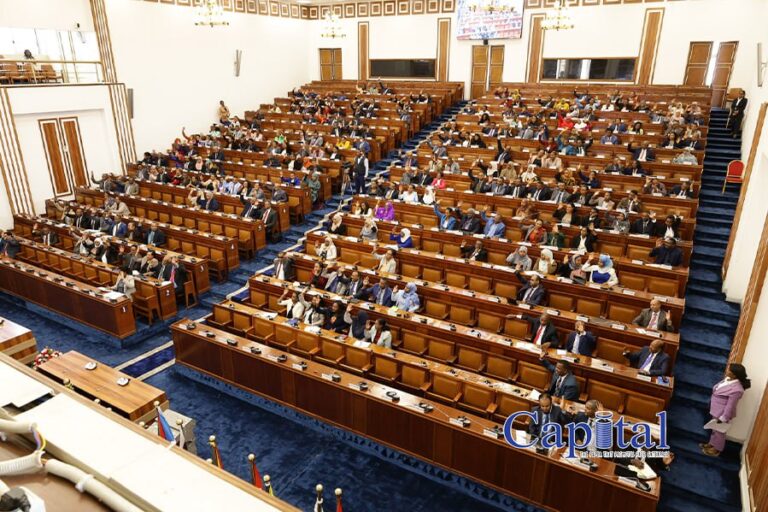The financial industry regulatory body, the National Bank of Ethiopia (NBE), has imposed five new directives on the banking sector, some of which restore practices that were altered a few years prior. There have been concerns expressed over the availability of qualified experts to designate as independent boards of directors in accordance with the new rules.
The NBE, in its new directive on bank corporate governance, has permitted bank staff to sit on the board, reintroducing the practice from before 2011.
Additionally, the regulatory body has modified the loan and advances restructuring iteration, reinstating the 2008 directive.
Regarding the SBB/91/2024 bank corporate governance directive, banks are obligated to fill one third of the board with independent persons who are unaffiliated with the bank.
It states in its definition that an independent director means a non-executive director who has no family of first degree consanguinity relationship or business, professional, or commercial relationship with the bank, and is neither part of senior management nor involved in the day-to-day operations of the bank. “An independent director is an experienced board member who is not under any undue influence, internal or external, political or ownership, that would impede their ability to exercise objective judgment.”
Industry experts noted that this kind of expertise is typical in other nations and will facilitate transparent governance. “It is a good decision that the NBE has made because independent directors who have no stake in the particular bank are highly aligned with professional principles,” a banking industry expert told Capital.
However, he did voice his fear that it would be challenging to get highly competent specialists. “It is challenging to find qualified experts at the remuneration that is paid by banks. Independent board members are very expensive in other countries,” he added.
Since 2011, the NBE has established a remuneration structure for bank board of directors, which has been amended several times.
According to the ‘limits on board remuneration and number of employees who sit on a bank board directive issued in 2018,’ board of directors compensation is 150,000 birr annually, with a monthly allowance of 10,000 birr.
He claims that “banking activity is profitable business and highly qualified experts are not interested in serving for such a small payment.” He also claims that “it is not a social duty.”
Experts stated that they expected the central bank to revise its compensation directive. They suggested keeping it open as it was prior to 2011.
To enhance the 2019 directive, the new corporate governance directive incorporates a number of additional clauses and articles. It specifies that the three categories of the board of directors’ composition are reserved for all shareholders, independent directors, and non-influential directors. Non-influential shareholders, including shareholders with less than 2% of shares, have been granted a special power to vote under the new guidelines.
The directive also allows bank employees to take positions on the board, which reverses article five of ‘Limits on Board Remuneration and Number of Employees Who Sit on a Bank Board Directive No. SSD/49/2011’ issued 13 years ago.
Article five of the 2011 directive stated that no employee of a bank, whether permanent or contractual, shall sit on the board of any bank.
Prior to the 2011 directive, staff were free to compete for positions on the board of directors, and certain executives, including powerful bank CEOs, held these positions.
The new corporate governance article 7.5 states that a maximum of two bank employees (including the chief executive officer and senior executive officers, but excluding the company secretary) may be elected to the board, “however, such employees cannot be chairperson of the board of the bank.”
Banking industry guru Eshetu Fantaye states that the corporate governance directive is a significant step toward maintaining prudence in the banking sector.
Eshetu praises Mamo Esmelealem, Governor of the NBE, for taking a bold step that would advance depositors’ and stockholders’ interests, as well as the financial sector as a whole.
“The decision to bar CEOs from serving on the board of directors was made in 2011 with the intention of focusing on certain individuals who might have conflicts with government-affiliated officials or members of the regulatory body, or the regulatory body believed that it might benefit the financial industry.”
According to him, “at least in my observation and experience,” the sector has been impacted by the decision to ban CEOs from the board.
Experts assert that some board members in certain banks are now serving the interests of big investors, who can easily control the bank and its management.
Eshetu remembers, “At the time of the NBE consultation regarding the directive, I was one of the two who argued strongly.”
The CEO’s function is managing the firm properly and maintaining their reputation. “If the CEO has a role on the board, those who will be affected are those ganging up on the board.”
“In certain banks, a specific set of directors work for the advantage of large shareholders, which has an impact on the majority stakeholders of the bank. And in this setting, the CEO has the option to resign from the position or accept the board’s decision,” he continued.
He acknowledged that the CEO could be able to influence the board to vote in their favor or work together with the other members, but he said, “In my opinion, the CEO would prioritize their professional reputation.”
He said countries in developed economies have gone through similar situations where “in some countries, CEOs have also taken the board chair position.”
According to him, this choice will increase the benefits for depositors and stockholders, and “we shall see the result in the near future.”
However, an expert who was present at the regulatory body at the time the order was issued said that its primary goal was to enforce duty separation and shield the bank from conflicts of interest.
According to the former NBE insider who was present when the directive was issued 13 years ago, “there was a thinking that the board should work independently without the influence of the executive body, which has higher technical capability and expertise than the board members who shall convince other members to give a direction that he wanted.”
“There are both types of administrative experiences,” he remarked, referring to comparable situations in other nations.
Loan prudence
The central bank also approved the adjustment of the asset classification and provisioning directive in the middle of this week, which reinstates the experience with loan restructuring that was used prior to 2018.
This is another bold action, according to sector experts.
The financial regulatory body said in a statement it released on Wednesday, June 12, that the directive aims to ensure prudent risk governance of banks by requiring loans and advances to be reviewed and classified on a regular basis in a way that is consistent with accepted principles of international accounting and regulatory standards.
It added that the asset classification and provisioning directive no. SBB/90/2024 requires banks to report all restructured loans of material size above 5% of their capital to the NBE and tightens the conditions for how banks treat restructured loans and non-performing loans.
As per the new directive, all non-performing loans (NPLs) must be placed under non-accrual status irrespective of the type of collateral provided to secure the loan as per Basel principles.
In the case of multiple loans to a client, if one of the loans is non-performing and accounts for 20% or more of the bank’s total exposure to the customer, all loans to this customer must automatically be reclassified as non-performing. The Directive introduces an ‘unlikely to pay’ class of loans to allow for circumstances that make loans unlikely to be repaid, irrespective of the number of past dues, to be treated as NPLs.
In order to avoid loans from becoming evergreen, the directive limits the number of restructuring iterations that a bank may undergo: three for short- and medium-term loans, and four for long-term loans, which were five and six respectively under directive no. SBB/69/2018.
According to an NBE statement, the directive has been aligned with International Financial Reporting Standards (IFRS) regarding the determination of Nonperforming Loans and provisioning requirements. Banks are now required to provide provisions for their on-balance sheet, as well as off-balance sheet exposures.
According to experts, NBE appears to have made a decision to conform to global norms and practices used in developed nations.
They said the loan restructuring iteration limit was revised during periods of economic uncertainty with the goal of protecting debtors and the economy as a whole.
Although experts indicated that the most recent judgment may not be good news for borrowers, the capital of the banking industry is being greatly impacted by inflation and the birr’s decline versus major international currencies.
Eshetu stated that the directive, which includes asset classification directives that were recently published, adheres to international norms and “seems to demand the protection of banks from indefinite loan books that may erode banks’ capital.”
Eshetu, who has held CEO positions at many banks and currently provides consulting services to a range of clients, including international organizations, recalls that a short-term loan with a one-year repayment deadline had the option to be restructured for up to five years.
Experts who agreed with Eshetu’s assessment stated that reorganizing loans, particularly those with medium and long-term periods, would significantly affect financial institutions.
“When loans are restructured, banks are highly affected,” they said.
They claimed that while banks and depositors are impacted by the significant decline in the value of the birr relative to its previous value and the highest rate of inflation, borrowers benefit from the fact that the value of their loans is less than what they were originally given.
“My observations indicate that banks’ capital will be harmed if some of the loans are not paid back quickly. Banks’ capital has deteriorated even if they have included interest,” Eshetu told Capital, “when we see the erosion of the birr value in the past few years, the birr loans that were taken about four years ago are lower in value when calculated in dollars.”
“Banks consider that the interest shall cover the expense, but in real terms, they are losing on this inflation and depreciation of the birr,” he said, recalling that banks are not adjusted for inflation or exchange rates on the loan provisions.Eshetu stated, “I assume that the directives from NBE were intended to shield banks from value and capital erosion.”
Experts, however, state that they anticipate forced measures to be treated as unique problems.
Financial industry experts concurred that further directions, such as those pertaining to exposure to related party directives, large exposures to counterparties or groups of connected counterparties, and requirements for persons with significant influence in a bank, are important steps in maintaining the health of the financial industry.








